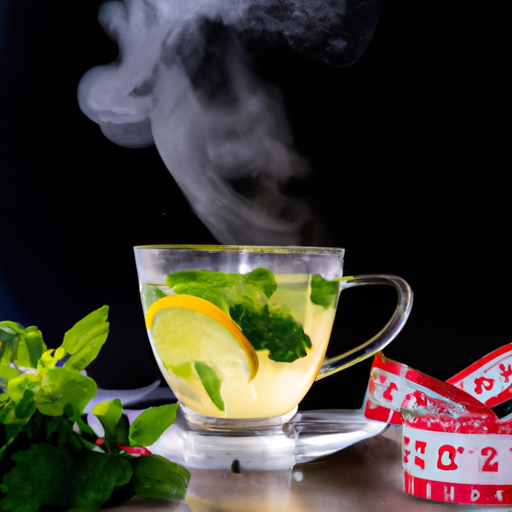They say, “An apple a day keeps the doctor away.” But have you ever considered the benefits of a cup of herbal tea? When it comes to easing constipation, many people opt for natural remedies such as herbal teas. These drinks have been utilized for generations to improve digestion and relieve discomfort.
But which herbal tea is best for constipation? In this article, we’ll explore the top contenders and their potential benefits.
- Peppermint tea is known for its soothing effects on the digestive system, while ginger tea has been hailed for its anti-inflammatory properties.
- Dandelion tea is believed to stimulate bile production, aiding in digestion, while senna tea is a powerful laxative.
- Chamomile tea is often used to calm the stomach and promote bowel movements, and fennel tea is thought to relieve bloating and gas.
- Lastly, licorice root tea may help soften stools and relieve constipation.
While these teas have been used traditionally for their potential benefits, it’s important to note that everyone’s body is different. What works for one person may not work for another. So, it’s always best to consult with a healthcare professional before incorporating herbal teas into your constipation relief routine.
Key Takeaways
- Peppermint tea: soothes digestive system, muscle relaxant properties, aids digestion, eases passage of stool.
- Ginger tea: anti-inflammatory properties, stimulates digestion, promotes bowel movements.
- Dandelion tea: stimulates bile production, acts as gentle diuretic, eliminates waste from body.
- Senna tea: powerful laxative, stimulates bowel movement, should be used in moderation.
Peppermint Tea
If you’re looking for a natural remedy to help relieve constipation, peppermint tea is your best bet! Peppermint tea has numerous benefits that can aid in digestion and alleviate constipation. The menthol present in peppermint tea acts as a muscle relaxant, which can help to ease the passage of stool through the intestines.
Additionally, peppermint tea has been shown to have antispasmodic properties, reducing the occurrence of painful cramps associated with constipation. To make peppermint tea, simply steep a handful of fresh or dried peppermint leaves in boiling water for about 5-10 minutes. You can add a squeeze of lemon or a teaspoon of honey for added flavor.
Now, let’s move on to the next herbal tea that can provide relief for constipation – ginger tea.
Ginger Tea
Try drinking ginger tea to help relieve your constipation. Ginger tea has been used for centuries as a natural remedy for various digestive issues, including constipation. It contains compounds like gingerol and shogaol that have anti-inflammatory properties and can stimulate digestion. These properties help promote bowel movements and alleviate constipation symptoms.
To make ginger tea, simply steep fresh ginger slices or ginger powder in hot water for about 10 minutes. You can also add honey or lemon for added flavor. Incorporating ginger tea into your daily routine may not only help relieve constipation but also provide other health benefits, such as reducing nausea and improving blood circulation.
Now let’s move on to the next herbal tea that can help with constipation: dandelion tea.
Dandelion Tea
Sipping on a warm cup of dandelion tea can provide a soothing and natural solution for your digestive discomfort. Dandelion tea has been used for centuries to promote healthy digestion and relieve constipation. It is known for its numerous health benefits, including its ability to stimulate the production of bile, which aids in the breakdown of fats and improves overall digestion. Additionally, dandelion tea acts as a gentle diuretic, helping to eliminate waste and toxins from the body.
To make dandelion tea, simply steep a teaspoon of dried dandelion leaves in a cup of hot water for about 10 minutes. You can also add honey or lemon for added flavor.
Incorporating dandelion tea into your daily routine can help alleviate constipation and promote a healthy digestive system. Now, let’s move on to the next herbal tea, senna tea, which is also known for its beneficial effects on constipation.
Senna Tea
Now let’s explore the invigorating effects of senna tea, a natural remedy that can help you achieve a healthy and regular digestive system.
Senna tea is known for its potent laxative properties, making it an effective solution for constipation relief. The active compounds in senna tea, called anthraquinones, stimulate the muscles in the intestines, promoting bowel movement. This herbal tea has been used for centuries to alleviate constipation and promote regularity. However, it’s important to note that senna tea should be used in moderation, as excessive consumption can lead to abdominal cramps and electrolyte imbalances. Additionally, long-term use of senna tea may cause dependence and may interfere with the absorption of certain medications. Therefore, it is advisable to consult with a healthcare professional before incorporating senna tea into your daily routine.
Moving on to chamomile tea, another herbal remedy that offers various health benefits.
Chamomile Tea
Indulge in the soothing warmth and delicate aroma of chamomile tea as it transports you to a serene and tranquil state of mind. Chamomile tea is not only a delightful beverage, but it also offers numerous benefits for those experiencing constipation.
This herbal tea has been used for centuries to ease digestive discomfort and promote regular bowel movements. Chamomile contains compounds that possess anti-inflammatory and antispasmodic properties, which can help relax the muscles of the digestive tract and alleviate constipation.
To experience its benefits, it’s recommended to drink 1-2 cups of chamomile tea per day. However, it’s important to note that individual tolerance and response may vary, so it’s best to start with a lower dosage and gradually increase if needed.
Moving forward, let’s explore the benefits of fennel tea for constipation.
Fennel Tea
Fennel tea is a herbal remedy that’s been used for centuries to relieve constipation and bloating. It’s known for its ability to stimulate digestion and promote healthy bowel movements. Research has shown that fennel tea can help relax the muscles in the gastrointestinal tract, which can alleviate constipation and reduce bloating.
Relieves Constipation and Bloating
Chamomile tea is the perfect choice to soothe your discomfort and ease constipation and bloating. It’s one of the most popular herbal teas used for its natural remedies for constipation relief. Here are five reasons why chamomile tea is effective in relieving constipation and bloating:
- Chamomile tea has anti-inflammatory properties that can help reduce inflammation in the digestive system, promoting better digestion.
- It acts as a mild laxative, gently stimulating the muscles in the digestive tract and helping to relieve constipation.
- Chamomile tea contains compounds that can help relax the muscles in the intestines, reducing bloating and gas.
- It has a calming effect on the stomach, reducing discomfort and promoting a healthy digestive system.
- Chamomile tea is rich in antioxidants that can help prevent damage to the digestive system, supporting overall digestive health.
Transitioning to the subsequent section, chamomile tea also supports healthy digestion by providing relief from constipation and bloating.
Supports Healthy Digestion
Soothing like a gentle river, chamomile tea aids in maintaining a healthy digestive system by providing relief from discomfort and bloating. Chamomile tea contains anti-inflammatory properties that help soothe the digestive tract and reduce inflammation. It also acts as a mild sedative, which can promote relaxation and relieve stress, both of which can contribute to digestive issues.
In addition to chamomile tea, incorporating probiotic-rich foods into your diet can also support a healthy gut. Probiotics are beneficial bacteria that can help improve digestion and reduce symptoms of bloating and constipation. Examples of probiotic-rich foods include yogurt, sauerkraut, and kefir.
Making lifestyle changes such as eating a high-fiber diet, drinking plenty of water, and exercising regularly can also improve digestion. These simple steps can help promote regular bowel movements and prevent constipation.
Transitioning to the subsequent section about licorice root tea, it’s another herbal tea that can provide relief from constipation.
Licorice Root Tea
You’ll love how Licorice Root Tea can help relieve constipation and promote healthy digestion. Licorice root has been used for centuries in traditional medicine for its numerous health benefits. It contains compounds that have anti-inflammatory properties and can help soothe and heal the digestive tract.
Licorice root tea has a gentle laxative effect, making it effective in relieving constipation. It can also help regulate bowel movements and reduce bloating and stomach discomfort. However, it’s important to note that licorice root should be consumed in moderation. Excessive intake can lead to side effects such as high blood pressure, low potassium levels, and water retention.
It’s always best to consult with a healthcare professional before adding licorice root tea to your daily routine.
Frequently Asked Questions
Can herbal teas be used as a long-term solution for chronic constipation?
Herbal teas can provide short-term relief for constipation, but their long-term effects are uncertain. While they may be effective for some, it’s best to consult a healthcare professional for a personalized approach to chronic constipation management.
Are there any potential side effects or contraindications associated with consuming herbal teas for constipation relief?
There are potential risks and contraindications associated with consuming herbal teas for constipation relief. It is important to be aware of these before using them as a long-term solution. There are also herbal tea alternatives available.
How does the taste of each herbal tea mentioned compare to one another?
When comparing tastes, Chamomile herbal tea has a mild, floral flavor while Peppermint herbal tea has a refreshing, minty taste. For constipation relief and taste satisfaction, a great pairing is Chamomile and Peppermint herbal teas.
Can pregnant women safely consume these herbal teas for constipation relief?
Pregnant women can safely consume certain herbal teas for constipation relief. However, it is important to consult with a healthcare provider before doing so, as some herbal teas may not be recommended during pregnancy.
Are there any specific recommendations regarding the dosage or frequency of consuming these herbal teas for optimal constipation relief?
There is no specific dosage or frequency recommendation for consuming herbal teas for constipation relief. It is best to consult with a healthcare professional to determine the appropriate amount and frequency based on individual needs and health conditions.
Conclusion
In conclusion, when it comes to finding relief from constipation, herbal teas can be a natural and effective solution.
Peppermint tea, with its soothing properties, may help relax the digestive system.
Ginger tea can aid in digestion and alleviate stomach discomfort.
Dandelion tea acts as a gentle laxative and may promote regular bowel movements.
Senna tea is a stronger option for more severe cases of constipation.
Chamomile tea can help soothe the stomach and promote relaxation.
Fennel tea may help relieve bloating and gas.
Licorice root tea has mild laxative effects and can support healthy digestion.
So, which herbal tea will you choose to find relief from constipation?










